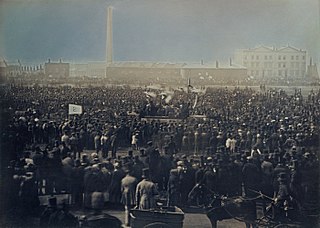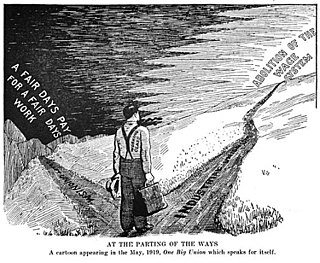 W
WAnti-capitalism is a political ideology and movement encompassing a variety of attitudes and ideas that oppose capitalism. In this sense, anti-capitalists are those who wish to replace capitalism with another type of economic system, usually some form of socialism.
 W
WThe 1918 Austro-Hungarian January strike was a strike which spread across Austria-Hungary between January 3 and 25, 1918 demanding better living and working conditions and an end to World War I. It is known as the "Jännerstreik" as opposed to the "Januarstreik" – a similar strike movement which lasted from 25 January to 1 February 1918 in Germany – Jänner being the usual spelling for January in Austria.
 W
WAutonomism, also known as autonomist Marxism and autonomous Marxism, is an anti-capitalist left-wing political and social movement and theory. As a theoretical system, it first emerged in Italy in the 1960s from workerism (operaismo). Later, post-Marxist and anarchist tendencies became significant after influence from the Situationists, the failure of Italian far-left movements in the 1970s, and the emergence of a number of important theorists including Antonio Negri, who had contributed to the 1969 founding of Potere Operaio as well as Mario Tronti, Paolo Virno and Franco "Bifo" Berardi.
 W
WChartism was a working-class movement for political reform in Britain that existed from 1838 to 1857. It took its name from the People's Charter of 1838 and was a national protest movement, with particular strongholds of support in Northern England, the East Midlands, the Staffordshire Potteries, the Black Country, and the South Wales Valleys. Support for the movement was at its highest in 1839, 1842, and 1848, when petitions signed by millions of working people were presented to the House of Commons. The strategy employed was to use the scale of support which these petitions and the accompanying mass meetings demonstrated to put pressure on politicians to concede manhood suffrage. Chartism thus relied on constitutional methods to secure its aims, though some became involved in insurrectionary activities, notably in South Wales and in Yorkshire.
 W
WThe Esperanto workers movement has the goal of taking practical advantage of the international language Esperanto for advancing the goals of the labour movement, especially the fight against unrestrained capitalism. It is not only a political movement in the strict sense but also a cultural and educational one. Currently the principal Esperanto associations active in the Esperanto workers movement at the global level are the Sennacieca Asocio Tutmonda and the Internacia Komunista Esperantista Kolektivo, and in a wider sense, the Monda Asembleo Socia.
 W
WA fair day's wage for a fair day's work is an objective of the labor movement, trade unions and other workers' groups, to increase pay, and adopt reasonable hours of work. It is a motto of the American Federation of Labor.
 W
WA labour festival is a festival related to the labour movement usually occurring annually. Labour festivals are some of the biggest political gatherings in Europe. Often they are outdoors in the summer and they incorporate music,, parades, film, historical commemoration and food and drink. One of the well-known ones is Durham Miners' Gala attended by some 100,000 attendees. Some are run by communist or socialist parties such as Fête de l'Humanité, Fête de Lutte Ouvrière, Avante! Festival, Odigitis festival and Festa Democratica. Some were formerly so, such as Edinburgh Labour People's Festival. Some commemorate trade unionism or history such as Burston Strike School and Tolpuddle Martyrs festival. Glastonbury Festival has a The Left Field and has been addressed by Labour leaders.
 W
WInternational Workers' Day, also known as Labour Day in most countries and often referred to as May Day, is a celebration of labourers and the working classes that is promoted by the international labour movement and occurs every year on May Day.
 W
WA mondina is a seasonal rice paddy woman worker, especially in Italy's Po Valley from the late 19th century to the first half of the 20th.
 W
WThe Revolutions of 1917–1923 was a revolutionary wave that included political unrest and revolts around the world inspired by the success of the Russian Revolution and the disorder created by the aftermath of World War I. The uprisings were mainly socialist or anti-colonial in nature. Some socialist revolts failed to create lasting socialist states. The revolutions had lasting effects in shaping the future European political landscape, with for example the collapse of the German Empire and the abdication of the German Kaiser.
 W
WThe Tenants' Strike or Broom Strike of 1907 was a popular movement against the rise in rents in tenant houses in the city of Buenos Aires and other Argentine cities, popularly called conventillos. The strike began in August 1907, it lasted approximately 3 months and more than one hundred tenants participated in the movement, with thirty-two thousand workers on strike. It had a significant presence of anarchist and socialist activists.
 W
WThe Vilna Group was a circle of Jewish Social-Democrats which met secretly in the city of Vilna, then part of the Russian empire. The group was founded in the mid-1890s. Its members devoted themselves to disseminating Marxist and socialist literature to Jewish textile workers and to some extent to Jewish and non-Jewish workers generally, providing literacy and education classes for workers and supporting the formation of trade unions. They were among the first to produce socialist literature in Yiddish. All this was illegal and had to be done clandestinely, and all members of the Vilna Group were arrested at various points. The Vilna group included, among others, Arkadi Kremer and his wife Pati Kremer, John Mill and Mikhail Liber. It was one of the precursors of the General Jewish Workers' Association in Lithuania, Poland and Russia, founded in 1897. The Vilna Group also played a role in founding the Russian Social-Democratic Workers' Party (RSDRP) in 1898. Most veterans of the Vilna Group later supported the Mensheviks.